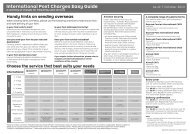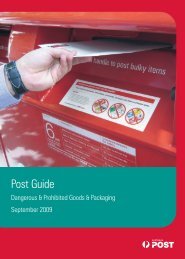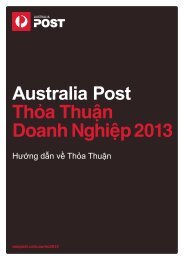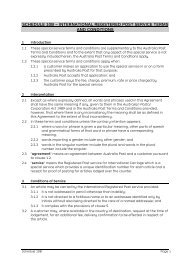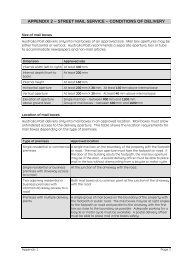Australia Post Annual Report 2008–09
Australia Post Annual Report 2008–09
Australia Post Annual Report 2008–09
You also want an ePaper? Increase the reach of your titles
YUMPU automatically turns print PDFs into web optimized ePapers that Google loves.
Our business<br />
Celebrating<br />
200 years<br />
At the heart of <strong>Australia</strong> <strong>Post</strong>’s success<br />
are two centuries of commitment by our<br />
people – come flood, fire, war or (as we are<br />
experiencing today) tough economic times.<br />
Across the nation, posties, contractors and<br />
retail staff are visible to the public, day in,<br />
day out. Behind the scenes, others are working<br />
around the clock in delivery centres, mail<br />
sorting facilities and offices. Together, they<br />
are ensuring that <strong>Australia</strong> <strong>Post</strong> continues<br />
to meet the community’s changing needs.<br />
Our history<br />
On 26 June 2009, <strong>Australia</strong> <strong>Post</strong> celebrated<br />
its 200th anniversary. The business that we<br />
are today is a far cry from the <strong>Australia</strong>n<br />
postal service’s beginnings back in 1809.<br />
On 26 June 1809, two months after former<br />
convict Isaac Nichols was appointed the<br />
first postmaster for the colony of New South<br />
Wales, his work began in earnest when the<br />
ship Experiment arrived in Sydney Harbour.<br />
Among its cargo was precious mail for<br />
this isolated community.<br />
Other postmasters were appointed as<br />
settlements sprang up across the continent.<br />
Throughout the nineteenth century, post<br />
offices were invariably among the first<br />
significant structures built in the towns and<br />
cities established around the land. Increasingly<br />
symbols of prosperity, they were often grand<br />
edifices that remain important parts of<br />
<strong>Australia</strong>’s heritage today.<br />
To deliver and collect mail across this vast<br />
network, <strong>Australia</strong>’s first posties overcame<br />
enormous challenges. On horseback, then<br />
guiding horse-drawn coaches, they played<br />
a vital role in establishing overland routes<br />
connecting what became, in 1901, the<br />
Federation of <strong>Australia</strong>. The various colonial<br />
postal services merged to form the federal<br />
<strong>Post</strong>master General’s Department (PMG),<br />
which managed mail as well as telegraph<br />
and telephone operations.<br />
At <strong>Australia</strong> <strong>Post</strong>, we’re celebrating. <strong>Australia</strong>’s postal service began<br />
in 1809, so in 2009 we are honouring our rich and remarkable history.<br />
But we are also celebrating the present and the bright future that awaits.<br />
We have come a long way to become one of the most progressive postal<br />
services in the world – and with a solid record of adaptation and innovation,<br />
we are looking forward to the next 200 years of success.<br />
Already, the postal service was evolving by<br />
managing these new forms of communication,<br />
while also progressively exchanging<br />
horsepower for trains and motor vehicles.<br />
Soon after federation, the PMG was quick<br />
to see the potential in aviation – <strong>Australia</strong>’s<br />
first airmail deliveries were made in 1914.<br />
The PMG’s – and the public’s – interest in<br />
the Air Mail service only grew in the years<br />
to come, as pioneers such as Charles<br />
Kingsford-Smith carried mailbags further<br />
and faster around the globe.<br />
The innovations continued until, in 1975, the PMG<br />
became two separate entities: the <strong>Australia</strong>n<br />
<strong>Post</strong>al Commission (trading as <strong>Australia</strong> <strong>Post</strong>)<br />
and the <strong>Australia</strong>n Telecommunications<br />
Commission (trading as Telecom <strong>Australia</strong>,<br />
now Telstra). Fourteen years later, the<br />
<strong>Australia</strong>n <strong>Post</strong>al Commission became<br />
the <strong>Australia</strong>n <strong>Post</strong>al Corporation under the<br />
<strong>Australia</strong>n <strong>Post</strong>al Corporation Act 1989 (Cwlth).<br />
Since becoming a government business<br />
enterprise, <strong>Australia</strong> <strong>Post</strong> has been required<br />
to operate as a fully commercial business.<br />
We reinvest profits in our operations or return<br />
them as dividends to our sole shareholder,<br />
the Commonwealth Government.<br />
Our future<br />
We are proud of our rich heritage but are always<br />
looking to the future. The history of <strong>Australia</strong> <strong>Post</strong><br />
has involved constant change, as we have<br />
adapted to the evolving needs of our customers<br />
and responded to shifts in the communications<br />
market. Over the past 200 years, a series of<br />
major change programs has transformed<br />
<strong>Australia</strong> <strong>Post</strong> into one of the world’s most<br />
efficient and progressive postal enterprises.<br />
This work is ongoing, as we invest in<br />
the people, technology, innovations and<br />
partnerships that will take us into the future.<br />
Central to our strategy for continued growth<br />
are our three core businesses: letters &<br />
associated services; agency services &<br />
retail merchandise; and parcels & logistics.<br />
We will continue to capitalise on our traditional<br />
strengths in these areas, while extending our<br />
capabilities, by:<br />
• ensuring that letters remain viable and<br />
relevant while actively pursuing opportunities<br />
in a digitally enabled marketplace<br />
• enhancing our suite of diverse multi-channel<br />
services and supporting these offerings with<br />
a compelling range of retail merchandise<br />
• extending our already substantial reach in<br />
domestic distribution and logistics while<br />
targeting further international opportunities.<br />
Our values<br />
We conduct our business with integrity<br />
and in compliance with all laws, regulations,<br />
codes and corporate standards relevant to<br />
our operations. We require our employees and<br />
contractors to commit to the highest ethical<br />
standards of behaviour in their dealings with<br />
customers, the corporation and each other.<br />
We are also committed to adopting<br />
and promoting principles of sustainable<br />
development. Therefore, we report<br />
openly on our sustainability performance;<br />
integrate social, environmental and<br />
economic considerations into our<br />
decision-making; and strive to make<br />
continuous improvements in all that<br />
we do. In <strong>2008–09</strong>, that improvement has<br />
included the introduction of a stand-alone<br />
corporate responsibility report (released<br />
in conjunction with this annual report),<br />
which strengthens our commitment<br />
to sustainable business success.<br />
We have come a long way: from one man<br />
operating the postal service at his home in<br />
colonial Sydney to a diverse and dynamic<br />
business employing tens of thousands of<br />
people across <strong>Australia</strong> and, increasingly,<br />
around the world. Much has changed between<br />
1809 and 2009, but our commitment to the<br />
community and our customers’ trust in our<br />
ability to deliver have remained constant.<br />
<strong>Australia</strong> <strong>Post</strong> <strong>Annual</strong> <strong>Report</strong> <strong>2008–09</strong> | <strong>Report</strong> of operations 03







